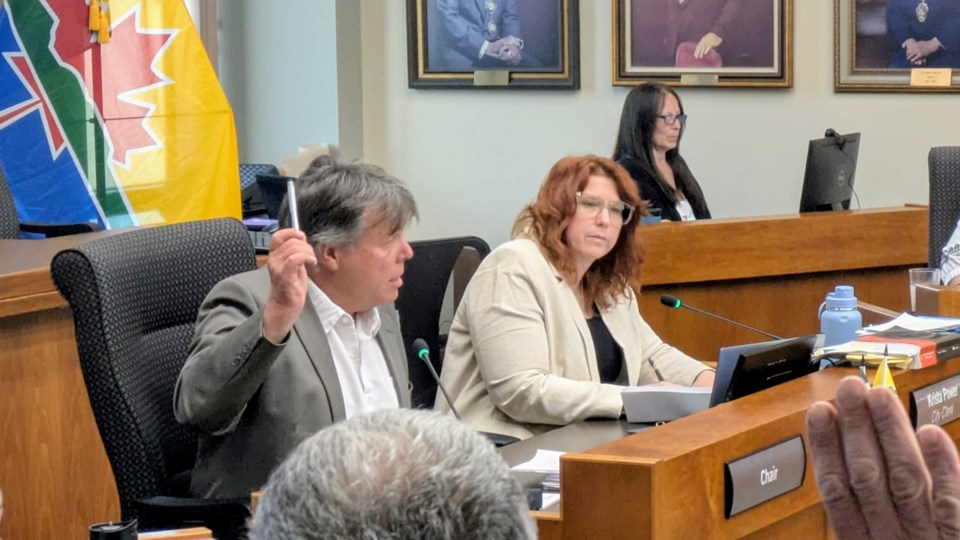THUNDER BAY – Starting this September, residents of Thunder Bay will see changes to how city council operates.
In a 9-4 vote, council approved a set of governance changes that will replace the committee of the whole structure with standing committees.
Councillors Albert Aiello, Dominic Pasqualino, Shelby Ch'ng, Michael Zussino, Kristen Oliver, Kasey Etreni, Greg Johnsen, Brian Hamilton, and Mayor Ken Boshcoff voted for the governance changes. Couns. Rajni Agarwal, Mark Bentz, Andrew Fould, and Trevor Giertuga voted against.
Anyone who pays attention to council meetings will notice some significant changes.
Right now, all 13 members of council can discuss each agenda item and questioning city staff at a committee of the whole meeting, ahead of the council meetings where they ratify their decisions.
Going forward, those conversations, will happen at one of three standing committees – growth, quality of life, and finance and administration – with four councillors, plus the mayor, sitting on each committee.
Krista Power, director of legislative services, said standing committees do not have the authority to decide on an agenda item. All final reports on the item are brought in front of city council for a ratified decision.
“One of the pieces that's most important that I'll outline for you is that there's no authorization. We sit now as committee of the whole, you have authorization to approve things by majority, that then goes to city council. Standing committee is not about authorization. Standing Committee is about feedback, consultation, and advice to administration on how they could put together their final report,” Power said.
A special committee of the whole meeting will be held for issues, like the budget, that have impacts across multiple aspects of city business.
The proposed changes will also include a two-and-a-half-hour time limit for each standing committee, as well as limits on how long each council member will get to speak on each topic.
Kristen Oliver asked how city’s strong mayor power factors into the new standing committee structure.
Power said, “the mayor has the authority unilaterally, with no veto power from this council, to decide who is the chair, to decide on any objectives to establish committees, to dissolve committees, all of those committees must be made up of members of council. It's not suitable for citizen committees. So, today, his worship could decide who is the chair of your committee of the whole, could decide who sits on your standing committees if that was the next step forward.”
Power said strong mayor powers can not veto at the standing committee level, but can “veto or bring forward a matter without debate or discussion that relates to a provincial priority. All of that is currently within the legislation. It's at city council only.”
Bentz said he was opposed to the governance changes because he would like be part of “discussion on the ground level.”
“There are many good ideas in here that I was not expecting to see along with this report. It's a very comprehensive report. But when you have four councillors and the mayor, kind of advising our administration. If I think somebody gets elected and they come to City Hall for a meeting, it shouldn't be advisory. I mean it should be more than that, and that's what committee of the whole offers. It offers the voice of council at every meeting, which I think is important. I think to get to the best decision,” Bentz said.
“I think policy should be designed for the worst-case scenario. The worst case scenario is you get a mayor that exercises all strong mayor powers. He picks the committee members according to his liking. He chairs all the committees. He does everything and controls the input into administration as well. That's the danger. And I think that the stop gap is the 13 councillors around the table being the authority at all points in the process.”
The council report stated that the committee of the whole structure will not be entirely thrown out. Budget meetings, closed sessions, and large infrastructure projects such as the temporary shelter village and multi-use tuff facility qualify as a special committee of the whole where feedback and any decisions wil be made at a full meeting of council.
Another point of contention among members of council is the dissolution of the 10 non-legislated advisory committees.
The clerk's office updated its recommendation to dissolve the advisory committees with a new timeline: “no later than December 31, 2025.” This would allow a transition period where “administration will determine how the objectives of these committees will continue,” to give input as a working group or task force.
Ch'ng point out that one per cent of the city’s infrastructure budget for new projects goes to projects of the clean, green and beautiful committee and asked what will happen to the work of that advisory committee once they were dissolved.
City manager John Collin said, “we'll work with the committee itself, explore options, pros and cons of all the options, but what is clear in the resolution is that those primary objectives of each committee, we will continue to do. We're just talking about different methodologies to get it done.”
“So that will still be part of the overall plan. We're not putting a resolution before you to alter that funding model. The only question will be how we will attribute those funds, and we'll work that through the transition period.”
Council voted on dissolving the 10 advisory committees separately from rest of the governance changes. The motion was carried 8-5.
Councillors Albert Aiello, Shelby Ch'ng, Michael Zussino, Kristen Oliver, Kasey Etreni, Greg Johnsen, Brian Hamilton, and Mayor Ken Boshcoff voted to dissolve the advisory committees, while Councillors Rajni Agarwal, Dominic Pasqualino, Mark Bentz, Andrew Fould, and Trevor Giertuga voted to keep them.
